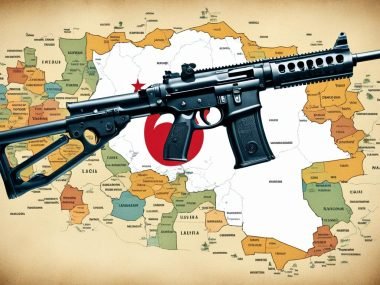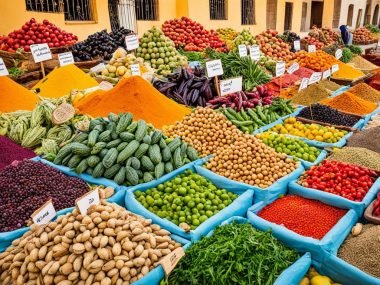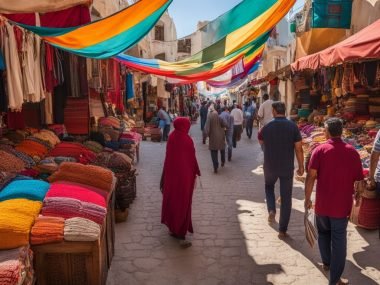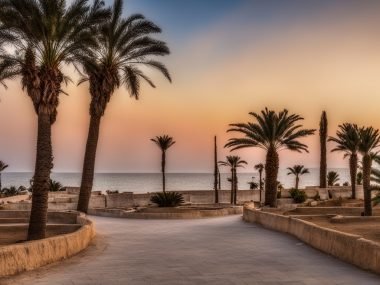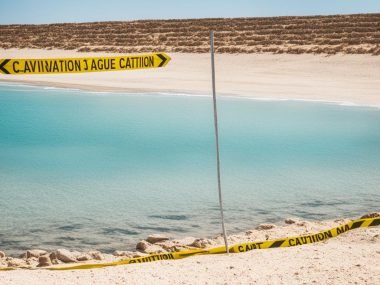Did you know some parts of Tunisia are not safe to visit? This is because of security risks. Places like Western Tunisia and areas near Libya are very risky. The risks come from possible terrorist acts and security operations. So, is it risky to visit Tunisia?
Travel is never 100% safe, and this is true for Tunisia. The FCDO advises against going to certain areas. Before you travel, make sure you know a lot about where you’re going. Also, check your travel insurance is good for these places. Reading up-to-date travel tips is key for a safe trip.
Key Takeaways
- Certain parts of Tunisia, particularly in the west and south, are flagged by the FCDO due to security concerns arising from terrorist activities and military operations.
- Travellers should avoid areas like the Chaambi Mountains National Park and regions near the Libya border.
- Being well-informed by reading the latest travel advice is essential to minimise risks.
- Ensure that your travel insurance covers your itinerary and planned activities.
- Adhering to travel advisories is crucial to avoid invalidating travel insurance.
Tunisia Travel Advisories
Getting the latest advice on Tunisia travel is key for a safe journey. The Foreign, Commonwealth, and Development Office (FCDO) gives important info. It talks about risky places and offers safety tips.
FCDO Travel Warnings
The FCDO warns those thinking of going to Tunisia. It mentions risky spots in Western Tunisia like the Chaambi Mountains. These places have terror threats and military doings. Listen to these warnings to stay safe. The south, near Libya, is also risky. Places like El Borma and Dhehiba should be avoided.
Areas To Avoid
Knowing which places to skip in Tunisia is vital. Zones near Algeria are high-risk too. Going there could be dangerous. It might also mean your travel insurance won’t cover you.
Personal Safety Tips
Safety is top when travelling in Tunisia. Always have ID with you. Follow the local laws and watch your things. Steer clear of protests and risky places. Staying updated with travel advice for Tunisia helps keep you safe.
General Security in Tunisia
Tunisia is a mix of old history and new ways. It focuses a lot on keeping people safe, especially those visiting. It’s key to know about the country’s safety steps to travel safely in Tunisia.
Police Presence
You’ll see a lot of security people in Tunisia. They’re in many places to keep an eye on things. This is very true in tourist spots. It makes visitors feel more secure.
Security Measures
Since 2015, Tunisia has been extra alert due to terror threats. Everyone must follow what the authorities say. Checkpoints are set up to check on people’s movements and keep things safe. You should keep up with advice from the Foreign, Commonwealth & Development Office (FCDO). And follow any curfews or rules set by Tunisian security forces.
To travel safely in Tunisia, be alert and follow local tips. Know what’s happening around you. This will help you have a fun and safe trip.
In short, Tunisia’s strong security measures and the hard work of the Tunisian security forces help keep travellers safe. This lets them enjoy Tunisia’s rich history and lively cities with ease.
Understanding Regional Risks
When you plan to visit Tunisia, it’s important to know about the risks. Separate areas, especially in the West and South, have different safety issues. Knowing what to expect helps you stay safe.
Western Tunisia
In Western Tunisia, near the Algeria border, danger is higher. Areas like El Kef and Jendouba are risky because of military actions and terrorist threats. The FCDO advises avoiding these places to stay safe.
Southern Tunisia
The South is tense too, especially near Libya. Conflicts in Libya affect towns like El Borma and Dhehiba. Terrorism and violence risks are why travelling there isn’t recommended.
Border Areas
Border zones next to Algeria and Libya are especially risky. Terrorism and local militants make these areas dangerous. Here’s a quick look at some critical spots:

| Location | Risk Factor | Advice |
|---|---|---|
| El Kef (Western Tunisia) | High | Avoid travel due to military operations and terrorist threats |
| Jendouba (Western Tunisia) | High | Do not travel; presence of militant activity noted |
| El Borma (Southern Tunisia) | Extremely High | Travel strictly not advised due to instability from Libya |
| Dhehiba (Southern Tunisia) | Extremely High | Advisories against travel due to security threats |
It’s key to stay up to date on risks when visiting Tunisia. Being careful in Western and Southern parts is crucial. Follow travel advice to protect yourself from harm.
Crime Rates in Tunisia
When you plan to visit Tunisia, you should know about its crime rates. Petty thefts and pickpocketing are common, mainly in busy tourist spots.
Theft and Pickpocketing
Pickpocketing in Tunisia is quite frequent, especially in crowded places. Tourists are often the targets. It’s important to be aware and protect your stuff.
Violent Crime
Violent crimes are less common here than in other places. But burglaries and robberies do happen. Being careful and avoiding lonely places at night is good advice.
Measures to Minimise Risks
To make your trip to Tunisia safer, there are steps to take:
- Don’t show off expensive jewellery or gadgets.
- Keep valuables safe, best in a hotel safe.
- Carry less cash and use credit cards when you can.
- Stay in touch with local authorities and get your news from trustworthy sources.
- Have a way to call for help if you need it.
These safety tips can make your visit much better and safer.
Political Unrest and Demonstrations
Tunisia’s politics have changed a lot, leading to unrest and protests. Travellers should know protests can start suddenly. While many are peaceful, they can quickly turn risky.
Recent Protests
Many issues have sparked recent protests in Tunisia. These include economic, political, and social problems. Important protests have happened in Tunis and other big cities. People are unhappy with how things are run. It’s key to follow the news for updates.
Safety During Demonstrations
If you’re in Tunisia during unrest, stay away from protests. They can get dangerous fast. Listen to what local authorities say and keep up with travel advice. Also, be aware that strikes could disrupt your plans. It’s good to stay informed.
Terrorism Threats
It’s very important to know about terrorism threats in Tunisia to stay safe. The past terrorist attacks and today’s threat level help make travel advice. They help keep travellers safe.
History of Terrorist Attacks
In the last few years, Tunisia has seen big terrorist attacks. Both local people and visitors were hurt. The 2015 attack on the Bardo Museum was very sad. Many people died.
The Sousse beach attack in 2015 was also terrible. Attackers shot at tourists showing Tunisia has a high risk of terrorism. These sad events tell us to be careful and watchful in Tunisia.
Current Terrorism Threat Level
Now, the terrorism threat level in Tunisia is still high. Terror groups are still a big risk. They want to disturb the peace and safety of the area.
The FCDO says to be extra watchful, especially in busy places and where tourists go. Being careful can help lower the risk of terrorism in Tunisia.

Travel Safety Tips for Tunisia
For a safe and fun trip to Tunisia, follow some important tips. These Tunisia safety tips help reduce risks while you enjoy the country.
Travel Insurance
Before your trip, get good travel insurance. It should cover everything you plan to do and any emergencies. Make sure it also covers cancellations and health problems to ensure secure travel in Tunisia.
Avoiding High-Risk Areas
Know the places to stay away from for a safe trip. The FCDO says to avoid some areas because of danger. Stay clear of these to avoid problems on your trip.
Emergency Contacts
It’s key to know who to call in an emergency. Have contact info for local authorities and the British Embassy. Also, tell the FCDO your travel plans to get help if needed.
Use these Tunisia safety tips for a worry-free trip. Planning and being careful makes your visit better. It helps you enjoy Tunisia safely and fully.
Specific Vulnerable Groups
Going to Tunisia can be different for women, LGBT+ folks, and those travelling alone. Here’s important advice to keep them safe. They can then enjoy their trip to this lovely country.
Women Travellers
Women visiting Tunisia need to be extra careful. More women are reporting unwanted attention, mainly in quiet spots. It helps to visit busy places, go in groups, and wear clothes that cover more to show respect for local ways.
Knowing what’s around you and staying away from lonely places at night is key to staying safe.
LGBT+ Travellers
If you’re LGBT+, remember being openly affectionate with someone of the same sex is not allowed. It’s best to keep a low profile
and not show affection in public. Try to connect with local LGBT+ groups and find safe places to go before your trip. This can help you feel more at ease.
Solo Travellers
Travelling alone means taking special steps to be safe. Tell a trusted friend about where you plan to go. Always check in with them.
Stick to places and hotels that are safe and popular. Having a local phone SIM can be very helpful for emergencies. Pay attention to what’s happening around you. Solo trips can be great but need careful planning.
In summary, following these tips can help women, LGBT+ folk, and solo travellers stay safe. This way, they can really enjoy what Tunisia has to offer.
Health and Safety Precautions
Before you go to Tunisia, it’s very important to think about your health and safety. Make sure your shots are all up to date. Doctors often suggest some shots for trips to Tunisia because of health risks.
Medical Facilities
In big cities like Tunis and Sfax, you’ll find good hospitals. But, in far places, the care is not the same. Think about getting insurance that covers medical flights in case of big health worries. Always bring a first aid kit and your own medicine.
Vaccinations and Health Risks
Talk to your doctor before you leave. This way, you can be sure you have all the shots you need. Health risks in Tunisia are not the same as in the UK. People often get shots for Hepatitis A and Typhoid. It’s good to know about diseases from mosquitoes, like malaria, even though they are rare in Tunisia.
Being careful with your health helps keep you safe. This way, you can have a great time in Tunisia. Always stay on top of your health and safety for the best trip.


